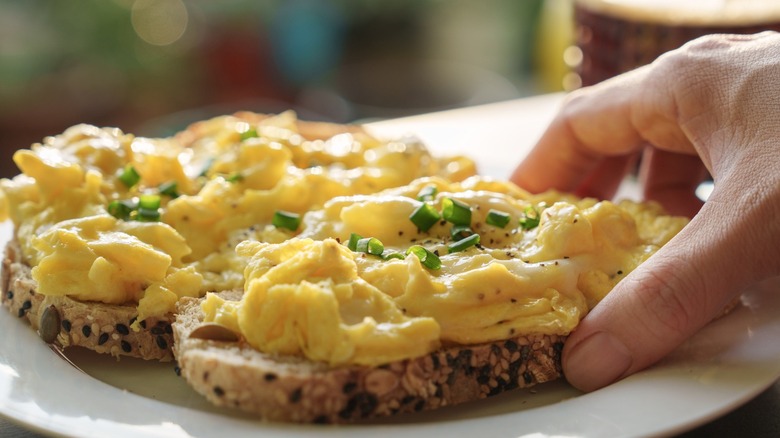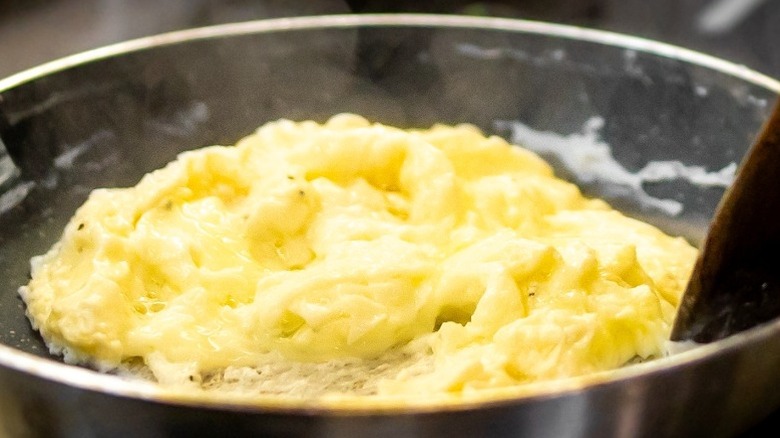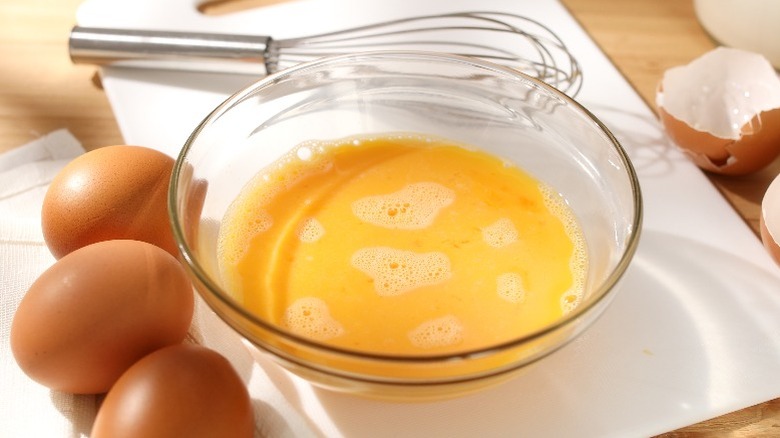Why Baking Powder Is The Missing Ingredient Your Scrambled Eggs Need
Scrambled eggs is one of those deceptively difficult recipes. They're easy to make but difficult to master. In fact, sometimes, it feels impossible to cook delicious scrambled eggs with a fluffy, cloud-like texture.
You look online, and it seems like everyone is trying to find the exact formula for whipping and cooking their way to perfect scrambled eggs. Celebrity chef Gordon Ramsay's foolproof technique for fluffy scrambled eggs works, but it requires constant attention you just don't have a busy weekday morning.
Fortunately, there's one trick that makes fluffy morning eggs easier than ever, and you don't need to master any new cooking skills, babysit your pan, or buy special ingredients or equipment. You can transform your scrambled eggs using a shelf-stable ingredient you likely already have in your pantry. Adding just a little baking powder to your whipped egg mixture gives you fluffy scrambled eggs in minutes.
Baking powder creates bubbles for fluffy eggs
Adding baking powder to your eggs may sound strange, but it's just food science. In the same way baking powder makes baked goods rise, it can make your scrambled eggs fluffy. Baking powder is a chemical leavening agent. Its main ingredient is another leavening agent, baking soda (sodium bicarbonate), which creates carbon dioxide bubbles when combined with a liquid and an acidic ingredient. Baking powder also contains its own acid. Eggs themselves aren't acidic (they're alkaline, if anything), so if you try to use baking soda alone, it won't work because there's nothing for it to react to.
But since it has acid already in it, once you put the baking powder into the eggs, the reaction starts. That means you shouldn't put the baking powder into the eggs until your pan is preheated. In fact, you shouldn't put the baking powder in until you're almost done whisking them into a scramble. Then add the baking powder, whisk to combine, and let it sit for 30 seconds to a minute to start the reaction before adding it to the pan.
But the baking powder isn't done yet. Most of today's baking powder is double-acting, meaning it will have a second reaction when you heat the mixture because it has a second acid, one that reacts to heat, and that's what makes this method superior to adding a splash of seltzer for fluffy scrambled eggs. The seltzer just doesn't have that vital second reaction.
Can you taste baking powder in eggs?
Adding baking powder to eggs is easy, but you may want to consider the taste of baking powder. Baking powder is a chemical consisting of a base (sodium bicarbonate) and acid. The chemical components give it a naturally bitter flavor. Fortunately, you only need a small amount to create a reaction. You can typically use it in such small amounts that the taste isn't noticeable. To keep the taste out of your eggs, it's key to add just a pinch of baking powder. About 1/16 teaspoon (or less) for every two eggs in your scramble is enough.
If that sounds like it's not much, that's because it isn't. Baking powder isn't a replacement for scrambling the eggs as you normally would. As usual, beat the eggs until they're a homogenous yellow color with no white or clear streaks. That requires a bowl about three times larger than you think you need. And instead of using a circular motion, whip your whisk back and forth like you're drawing a Z. Only after you achieve the uniform yellow color should you add the baking powder.
Done right, this method should result in a fluffy texture without any baking powder taste. But since baking powder is chockfull of sodium (in the form of sodium bicarbonate), don't add much or any salt upfront until you're sure how it impacts the flavor. If you're still concerned about tasting the baking powder, you can always add herbs and spices, chopped onion, cheese, or other flavorful ingredients to your scramble. There are many unexpected and tasty ingredients to upgrade your scrambled eggs and mask any baking powder flavor.


